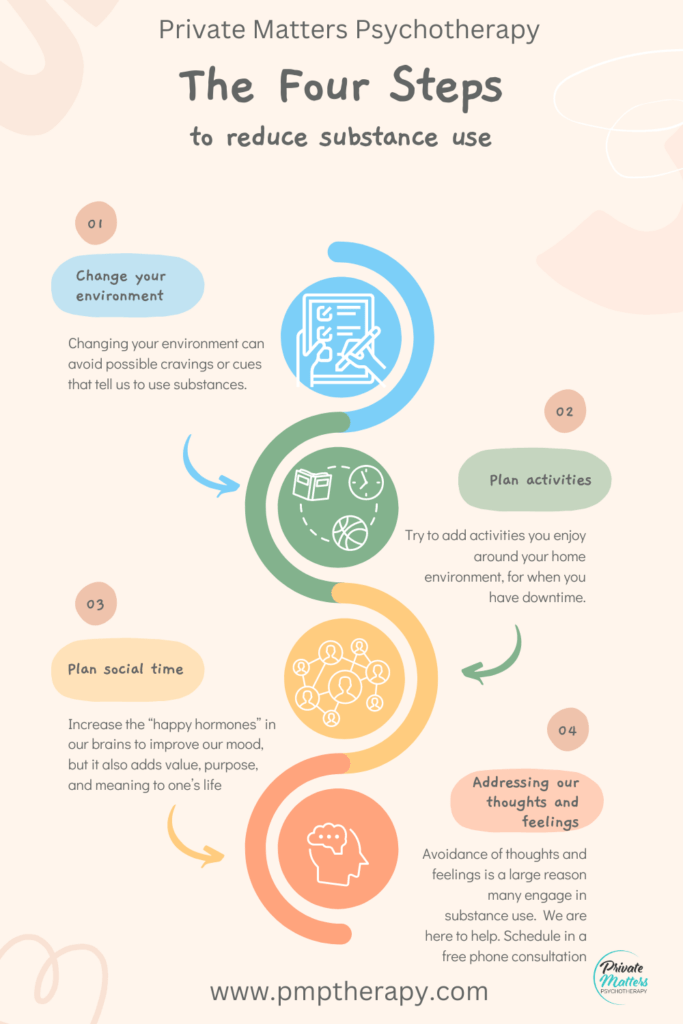Hidden Demons – The Deep Impact of Substance Use on Mental Health
Substance use and its impact on mental health is a complex and significant topic that deserves our attention. In today’s society, it’s all too common for individuals to turn to substances as a coping mechanism or a means of escape from life’s challenges. However, this approach often leads to detrimental consequences, affecting both their physical and mental well-being. In this article, we delve into the intricacies of substance use, uncovering the reasons why it can be unhealthy and how it intertwines with mental health issues.
What is Unhealthy Substance Use?
Addiction or unhealthy substance use refers to individuals who use substances (alcohol and/or drugs) in a pattern that may interfere with their normal daily functioning, health, work, family, or social life. Substances can be used recreationally, to aid in managing an ailment or pain, or to elicit or dampen certain feelings.


Substance misuse and mental illness are strongly linked. Did you know that those with a mental illness are twice as likely to have a substance use disorder compared to the general population? On the other hand, those with substance use disorders are up to three times as likely to have a mental illness (CAMH, 2023).
What are some reasons for regular substance use?
Those who use substances regularly, or misuse substances, typically may use them to manage physical pain, avoid thoughts, memories, or feelings, or cope with a lack of social connection or lack of a stimulating environment.
Physical pain can negatively affect an individual’s mental health, functionality, and overall wellness. Using substances to cope with or manage pain can be a short-term solution to a long-term problem. In the short term, using substances can alleviate pain and may even improve functionality. In the long-term, substances will negatively impact mental and physical health, while the ailment does not improve.
When struggling with difficult thoughts, memories, or feelings, it is common for those to want to find a way to cope with or avoid these experiences. Wanting to avoid negative experiences is only human, and using substances to do so is an act of escapism. This is shown in the rates of mental illness and substance use disorders occurring together, as it is a common method for individuals to cope with their struggles. Unfortunately, regularly using substances to avoid mental illness, life problems, negative thoughts, and regulate feelings helps in the short-term, but worsens mental health in the long-term. Substances may increase symptoms of mental illness, harm your brain and bodily health, and even trigger new symptoms as well as interfere with healthy sleep and eating, further decreasing a person’s quality of life.
In the long-term, substances will negatively impact mental and physical health, while the ailment does not improve.
Lastly, those who find themselves with a lack of social connection, or in an environment that is not stimulating, are more likely to turn to substances to elicit or dampen a certain feeling. Did you know this has been proven in rats? In a study done by Bruce Alexander (1981), researchers took rats and placed them in one of two cages: the first cage was small and bare and only had one rat in the cage, and the second cage was a large rat park with things to play with and other rats in the cage. Each cage also had two water stations, one with regular water, and another with morphine water. They found that the rats in the first cage, with no social connection and an environment that was not stimulating, overused the morphine water. The rats in the second cage, with other rats and a stimulating environment, did not use the morphine water.
This is all to say that humans are social animals that need social interaction and an environment that is engaging. Without this, we are more likely to use substances to cope with loneliness or boredom.

Tips to reduce substance use
Breaking free from the cycle of using substances to avoid difficult feelings and emotions can be a challenging but transformative journey. The allure of escaping pain and discomfort through substances often masks the underlying need for healthier coping mechanisms. Here are some practical tips and strategies that can help reduce or completely stop relying on substances as a crutch.
Change your environment
Our environment can send cues to our brains and bodies to crave substances. For example, if we usually use substances around a certain group of people, at a particular bar, in a specific room in our house, or around a regular time. Changing your environment can avoid possible cravings or cues that tell us to use substances.
Plan activities or enhance your environment
Planning activities for fun, relaxation, or enjoyment add to our quality of life and can improve mood. Try to add activities you enjoy around your home environment, for when you have downtime. This could be video or card games, exercise, books, a new craft or hobby, cooking or baking, music or musical instruments, writing, meditation, learn a new skill, etc.
Plan social time
Social interaction and feelings of social connection not only works to increase the “happy hormones” in our brains to improve our mood, but it also adds value, purpose, and meaning to one’s life. Social support is a very important determining factor in our mental and physical health, so it’s helpful to plan time with friends, family, and others.
Addressing our thoughts and feelings
Avoidance of our thoughts and feelings is a large reason many engage in substance use. Trying to sit with our feelings as they come to us in the present is difficult and uncomfortable in the short-term, but helps us in the long-term. Try writing what thoughts and feelings come to mind and practice breathing deeply through these experiences. Feelings and thoughts are always temporary, and come in waves, so we can try to simply ride the waves as they come and remember they will pass.

 Book A Free Consultation
Book A Free Consultation